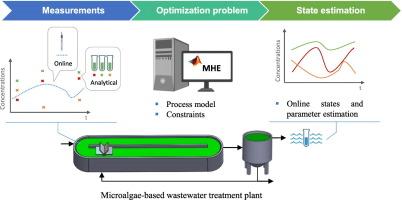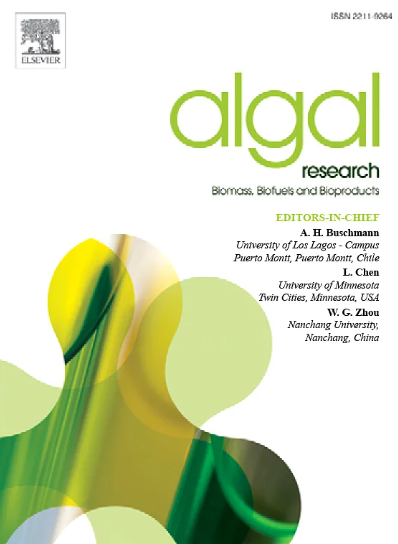基于微藻-细菌的污水处理中移动水平估计的在线和分析多速率测量
IF 4.5
2区 生物学
Q1 BIOTECHNOLOGY & APPLIED MICROBIOLOGY
Algal Research-Biomass Biofuels and Bioproducts
Pub Date : 2025-10-01
DOI:10.1016/j.algal.2025.104338
引用次数: 0
摘要
人口增长和工业化导致废水产量大幅增加,从而使水净化成为全球范围内的主要问题。在这种情况下,基于微藻-细菌的废水处理已经成为一种低能耗废水处理和养分回收的解决方案。然而,这种类型的污水处理厂的运行更为复杂,需要先进的控制系统,能够在环境变量和废水成分周期性变化的情况下将其关键变量保持在适当的范围内。通常,在这些过程中实施状态反馈控制律和基于模型的控制技术需要实时了解系统的状态和其他变量的全部信息。然而,在实际情况下,由于需要更可靠的测量设备或在线传感器的高成本,只有微藻-细菌过程的一部分变量可以在线测量。此外,这些生物过程受到频繁变化的影响,因此代表它们的模型参数需要不断适应。本文介绍了移动水平估计技术在微藻-细菌废水处理过程中的应用。本研究的目的是估计那些不能可靠地在线测量的变量或参数。该过程是非线性的,且存在状态和参数的不确定性。使用MATLAB®软件对估计进行编码,仿真结果证明了估计在该生物过程中的有效性,其特点是可以进行多速率测量。本文章由计算机程序翻译,如有差异,请以英文原文为准。

Moving horizon estimation in microalgae-bacteria based wastewater treatment using online and analytical multi-rate measurements
Population growth and industrialization have resulted into a substantial increase in wastewater production, thereby establishing water purification as a primary concern on a global scale. In this context, microalgae-bacteria based wastewater treatment has emerged as a solution for wastewater treatment and nutrient recovery at a low-energy demand. Nevertheless, operation of this type of wastewater treatment plants is more complex and requires of advanced control systems, capable of maintaining its key variables within appropriate ranges in spite of the periodic variations in environmental variables and wastewater composition. Very often, the implementation of state feedback control laws and model-based control techniques in these processes necessitates full information of the states and other variables of the system in real-time. However, in practical scenarios, only a subset of the variables of microalgae-bacteria processes can be measured online due to the need for more reliable measuring devices or the high costs of online sensors. In addition, these biological processes are subjected to frequent variations, so that the parameters of the models representing them requires continuous adaptation. This paper presents the application of a moving horizon estimation technique to a wastewater treatment process with microalgae and bacteria. The objective of this study is to estimate those variables or parameters that cannot be measured reliably online. This process was nonlinear and subject to uncertainties in the states and parameters. The estimation was coded using MATLAB® software, and simulation results demonstrated the effectiveness of estimation in this biological process, characterized by the availability of multi-rate measurements.
求助全文
通过发布文献求助,成功后即可免费获取论文全文。
去求助
来源期刊

Algal Research-Biomass Biofuels and Bioproducts
BIOTECHNOLOGY & APPLIED MICROBIOLOGY-
CiteScore
9.40
自引率
7.80%
发文量
332
期刊介绍:
Algal Research is an international phycology journal covering all areas of emerging technologies in algae biology, biomass production, cultivation, harvesting, extraction, bioproducts, biorefinery, engineering, and econometrics. Algae is defined to include cyanobacteria, microalgae, and protists and symbionts of interest in biotechnology. The journal publishes original research and reviews for the following scope: algal biology, including but not exclusive to: phylogeny, biodiversity, molecular traits, metabolic regulation, and genetic engineering, algal cultivation, e.g. phototrophic systems, heterotrophic systems, and mixotrophic systems, algal harvesting and extraction systems, biotechnology to convert algal biomass and components into biofuels and bioproducts, e.g., nutraceuticals, pharmaceuticals, animal feed, plastics, etc. algal products and their economic assessment
 求助内容:
求助内容: 应助结果提醒方式:
应助结果提醒方式:


